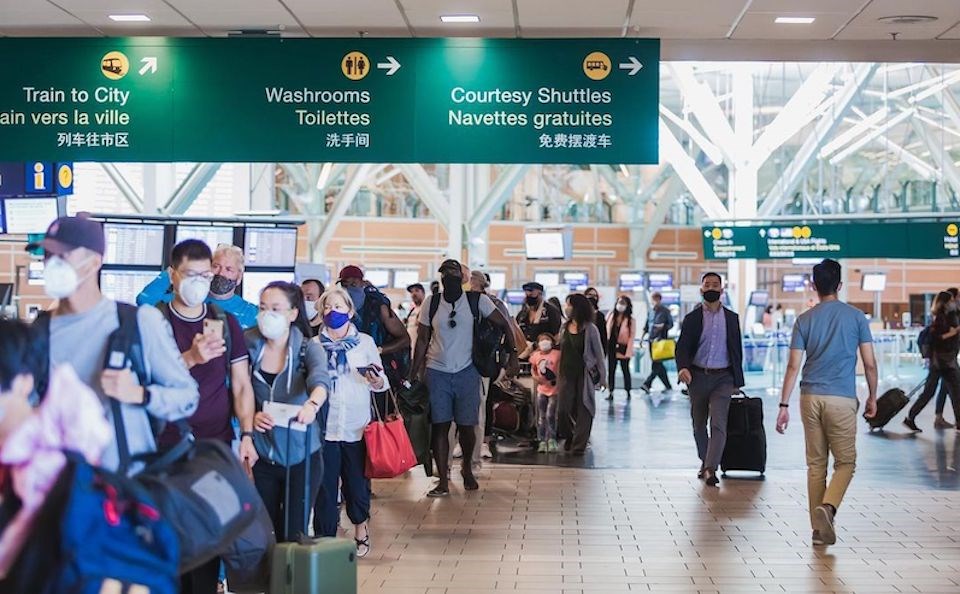As one of the most popular travel times of the year, spring break sees a staggering increase in passenger volumes at Vancouver International Airport (YVR) -- but there are several things people can do to keep their travel plans running smoothly.
Between March 10 and March 24, YVR expects 880,573 travellers to pass through the airport. This figure represents 88 per cent of passenger volumes seen in 2019, when 1,000,293 passengers travelled during that same period.
The airport expects to see an average of 58,705 passengers each day. However, there are a couple of days you might want to jot down in your calendar.
Wednesday, March 15 and Friday, March 24 are expected to be the two busiest days at the airport.
The airport has also highlighted the most popular destinations for travellers departing from YVR over the busy travel period.
For domestic travellers, the majority of Vancouver flights are headed to visit the Toronto Lester B. Pearson Airport (YYZ), the Calgary International Airport (YYC), and the Edmonton International Airport (YEG).
South of the border, the most popular destinations include the Los Angeles International Airport (LAX), San Francisco International Airport (SFO), Kahului Airport (OGG), the Daniel K. Inouye International Airport (HNL) in Honolulu, and the Harry Reid International Airport (LAS) in Las Vegas.
Internationally, most Vancouver travellers are headed to the Hong Kong International Airport (HKG), the Cancun International Airport (CUN), the Narita International Airport (NRT) in Tokyo, the Indira Gandhi International Airport (DEL) in Delhi, or the London Heathrow Airport (LHR).
The airport says it will continue to work with the Canadian Air Transport Security Authority (CATSA) and its partners to provide "a safe and seamless experience" for travellers. Additionally, it will use its Digital Twin -- a virtual, real-time interactive representation of YVR’s terminal and airfield -- to monitor passenger volumes and airfield capacity and make "real-time data-driven decisions."
Tips for taking Vancouver flights at YVR during spring break 2023
Air passengers can do several things in advance of travel to save time at the airport.
For departing air travellers from YVR:
- U.S. Customer Customs Mobile Passport Control (MPC) app: The U.S. Customs and Border Protection offers an MPC app that allows travellers to submit information digitally before they visit the border. By using the app, travellers may "experience shorter wait times, less congestion, and efficient processing."
- "Skip the line" on your U.S. flight: Travellers to the United States can also "skip the line" by reserving a time slot via the new YVR Express program. You may reserve a spot up to 72 hours in advance
- jetSet valet parking: Locals driving to the airport can reserve their spot for jetSet’s 24/7 valet parking facility in advance online. Customers can enjoy the complementary 24/7 round-trip shuttle service to the Main Terminal.
- Check-in online before you leave: Travellers are encouraged to check flight details with YVR online or with their airline before arriving. By checking in before you arrive, you can avoid lining up to get your boarding pass and it will appear on your smart device. You may also print off a copy..
- Arrive well in advance of your departing flight: YVR advises travellers to arrive at least two hours before domestic flights and three hours before U.S. and international ones. However, you should give yourself more time — and more time on your commute to the airport — during inclement weather.
- Consider public transportation: To avoid the roads, consider taking the convenient Canada Line, which will take you directly to the airport from downtown Vancouver in 30 minutes.
For arriving air travellers to YVR:
Use ArriveCAN to fill out your CBSA declaration in advance.
- Travellers who arrive at YVR can make their customs and immigration declaration to the CBSA before they arrive via the ArriveCAN app.
- Travellers who do this can use the express lanes to get to an airport kiosk or eGate faster.
- Find out more information about how to use the feature with our guide.
For those picking up a traveller arriving from within Canada, passenger pickup has been temporarily relocated to Level 1 to make way for roadway and sidewalk improvements happening on Level 2.




